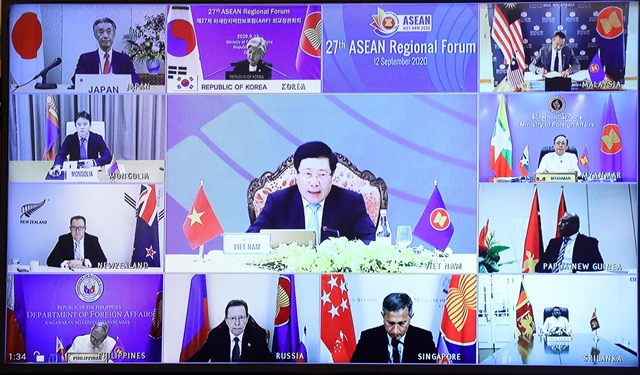
HÀ NỘI – The 27th ASEAN Regional Forum (ARF), as part of the 53rd ASEAN Foreign Ministers Meeting (AMM 53) and Related Meetings, has adopted several important documents, including the ARF Hanoi Plan of Action II, setting out co-operation priorities and directions for ARF activities in the 2020-2025 period.
The forum, which was held via video conference on Saturday under the chair of Vietnamese Deputy Prime Minister and Foreign Minister Phạm Bình Minh, was attended by foreign ministers from 27 ARF member nations and organisations, and ASEAN Secretary-General Lim Jock Hoi.
In his opening speech, Minh spoke highly of the role of the ARF, a key forum for dialogue and co-operation on political and security issues in the region.
Amid unprecedented challenges in the region and the world, he proposed the participants discuss and identify directions and measures to take the best of the ARF, especially in fostering dialogue and co-operation, strengthening mutual trust, narrowing differences, and promoting trust building and preventive diplomacy, thereby contributing to the maintenance of regional peace, stability and prosperity.
The ministers noted that, despite the difficulties caused by the COVID-19 pandemic, the countries have maintained dialogue and co-operation, and implemented a range of innovative and flexible measures to adapt to the new situation.
In 2019 and 2020, the ARF has organised 12 activities on key agenda, including applying the Convention on the Law of Sea and international legal documents, improving capacity for early warning of disasters and cyber security.
The ministers stressed that the ARF should devise measures to build trust and enforce preventive diplomacy while further strengthening co-operation in priority areas such as disaster relief, counter-terrorism and transnational crime combat, marine security, cyber security, non-proliferation and disarmament of nuclear weapons and weapons of mass destruction.
The forum should also improve its operations while enhancing coordination with other ASEAN mechanisms such as EAS and ADMM +, the ministers said.
Amid the multifaceted challenges posed by the COVID-19 pandemic, the ministers shared the view that the ARF should cooperate in responding to and mitigating impacts of the COVID-19 outbreak and infectious diseases, taking advantage of the ARF in disaster relief activities and civilian military coordination. Hence, the ministers supported Việt Nam's proposal to issue the ARF Statement on Enhancing Cooperation to Prevent and Respond to Infectious Disease Outbreaks.
The meeting reached consensus that stakeholders continue dialogues to resolve differences towards sustainable peace on the Korean Peninsula without nuclear weapons. The ministers called for the full and effective implementation of relevant resolutions of the United Nations Security Council.
The ministers reiterated the importance of maintaining peace, stability, security, safety and freedom of navigation and aviation in the East Sea (internationally known as South China Sea). Amid complicated developments, serious incidents and violations of international law and the 1982 United Nations Convention on the Law of the Sea (UNCLOS), the ministers emphasised the need to self-restrain, avoid acts that further complicate the situation and militarisation, and settle disputes in line with international law, including the 1982 UNCLOS.
The meeting supported the full and effective implementation of the Declaration on Conduct of Parties in the East Sea (DOC), and urged ASEAN and China to soon finalise an effective and efficient Code of Conduct in the East Sea (COC) in accordance with international law, especially the 1982 UNCLOS.
Addressing the event, Deputy Prime Minister and Foreign Minister Phạm Bình Minh emphasised that the ARF needs and is able to further promote its role and contributions, especially in maintaining dialogue and cooperation, strengthening mutual trust and mutual understanding and coordination of policies and actions to actively and effectively respond to existing and emerging challenges, including the COVID-19 pandemic and infectious diseases.
He suggested the countries effectively implement the ARF Hanoi Plan of Action II, the ARF Statement on Enhancing Cooperation to Prevent and Respond to Infectious Disease Outbreaks and other statements and initiatives adopted at the forum.
Regarding the East Sea, Minh emphasised the common interests and responsibility of all countries in maintaining and promoting peace, stability, security, safety and freedom of navigation and aviation in the East Sea.
He expressed his concerns over complicated developments, incidents and acts violating the legitimate rights and interests of coastal countries, and reiterated ASEAN's principled position on the East Sea stated in the Joint Communiqué of the 53rd ASEAN Foreign Ministers’ Meeting. He underlined the need to respect law, self-restrain, avoid acts that further complicate the situation and militarization, and settle disputes on the basis of international law and the 1982 UNCLOS
ASEAN will spare no effort, together with China, to fully and effectively implement the DOC and soon complete an effective and efficient COC in line with international law, especially the 1982 UNCLOS, Minh affirmed.
The ministers approved the AFR Hanoi Plan of Action II, setting out cooperation priorities and directions for ARF activities in the 2020-2025 period.
They also adopted the ARF Statement on the Treatment of Children Recruited by or Associated with Terrorist Groups and the ARF Statement on Cooperation in the Field of Security of and in the Use of ICTs in the Context of International Security.
The meeting also issued the Chairman’s Statement of the 27th ARF. VNS
Xem thêm: lmth.stnemucod-tnatropmi-stpoda-murof-lanoiger-naesa-ht72/372277/swal-scitilop/nv.swenmanteiv